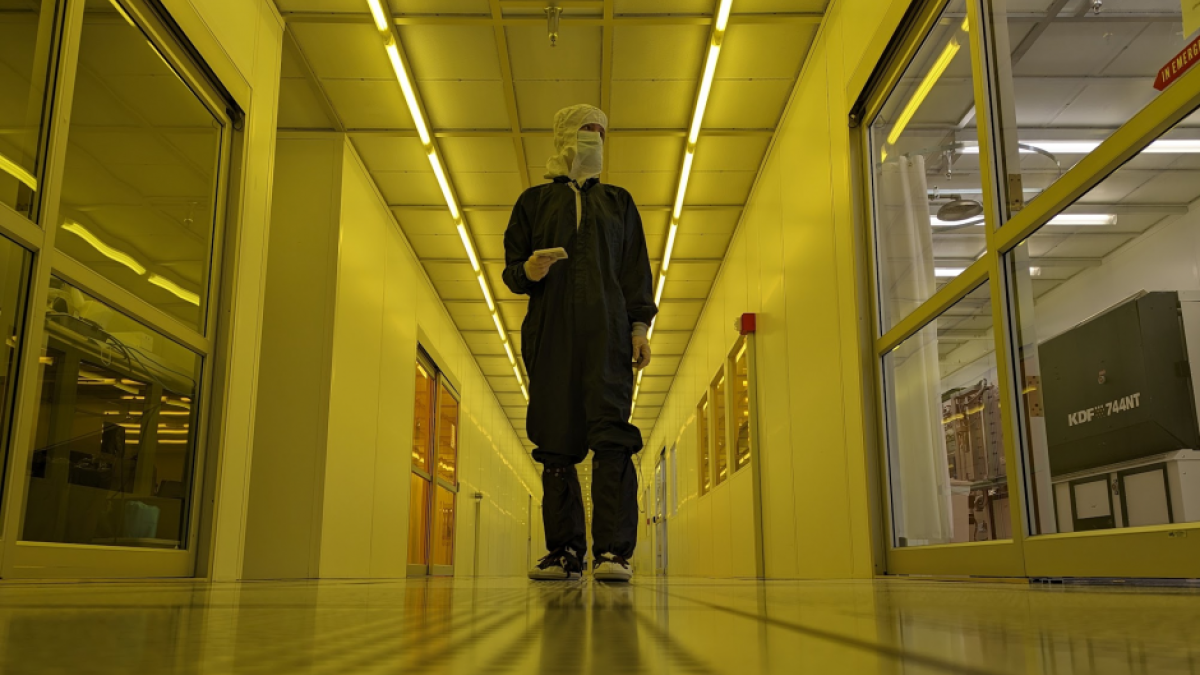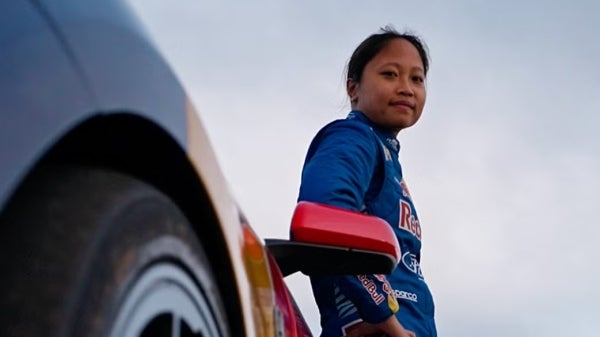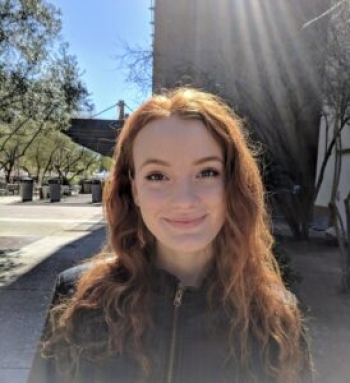From solar energy to water quality to art, honors graduate fulfilled many interests at ASU

Erin Burgard, dressed in overalls, head cover, mask and gloves, enters the lab area to work on her perovskite solar panel research. Photo courtesy of Erin Burgard
Editor’s note: This story is part of a series of profiles of notable spring 2024 graduates.
Erin Burgard fulfilled her wide-ranging interests — engineering, solar energy, water quality, languages and art — while an undergraduate at Arizona State University.
Burgard is graduating in May with a bachelor’s degree in environmental engineering, a Spanish minor and a certificate in environmental humanities, with honors from Barrett, The Honors College at ASU. She put her skills into action through research, community service and entrepreneurship.
As a NASA Space Grant intern, she worked with Nicholas Rolston, assistant professor in ASU's School of Electrical, Computer and Energy Engineering, researching the effects of heat and pressure on solar cells made of perovskite, a semiconductor material that has the potential for high performance and low production costs, in a lab at MacroTechnology Works at the ASU Research Park in Tempe, Arizona. Watch a video of Burgard talking about her research on YouTube.
Burgard said her research, which was the subject of her honors thesis, has implications for possibly replacing commonly used silicon with perovskites in the manufacture of solar cells for use on spacecraft and solar panels on Earth.
She spent four months during the summer of 2023 in the Research Experience for Undergraduates program at the Institute for Nanoscale Science and Engineering at Vanderbilt University in Nashville, Tennessee, where she worked on thin films for use in solar cell applications.
In addition to her solar energy research, Burgard served as an Engineering Futures Mentor, helping guide first- and second-year, first-generation, female and underrepresented students in the Ira A. Fulton Schools of Engineering, and as an Engineering Futures Program Aide, assisting with program development and implementation, training mentors, and planning and hosting events.
She also worked part-time as the project development manager for 33 Buckets, an organization co-founded by ASU alum Mark Huerta that provides clean water solutions for rural communities in Peru and other countries.
Burgard stretched her creative muscles by starting Handmade With Love, a custom greeting-card business, where she designs and hand-makes cards featuring her own painting and calligraphy. She makes cards for any occasion, including birthdays and holidays. Nonprofit organizations have used her cards for silent-auction fundraisers and to thank donors.
Burgard’s ultimate goal is to use her engineering degree and Spanish language skills to work abroad in Spain.
“I want to be completely fluent in Spanish, and I want to travel, meet new people and experience new cultures,” she said.
We asked Burgard to reflect on her undergraduate experience at ASU. Here’s what she had to say.
Question: What was your “aha” moment when you realized you wanted to study the field you majored in?
Answer: I started off college as a mathematics major simply because I always enjoyed math in school. However, upon listening to a speech about international water treatment work in developing communities, I knew my love for math needed to be more applied to serve the community I wanted to serve. So, I switched to environmental engineering, which has a heavy focus in water treatment design.
Q: What’s something you learned while at ASU — in the classroom or otherwise — that surprised you or changed your perspective?
A: My capstone class taught me that design work and technical concepts are only at the tip of the iceberg of engineering. Below, there is a strong foundation of ethics, social well-being, communication and other skills that are important to have not just in engineering, but in life.
Q: Why did you choose ASU?
A: I grew up in Arizona, so I wanted to stay close to my family while getting an education with strong support for STEM students.
Q: Why did you choose Barrett Honors College?
A: Barrett Honors College promised a community of diverse backgrounds and majors, which I would not have gotten in just my engineering degree.
Q: Which professor taught you the most important lesson while at ASU, and what was that lesson?
A: Dr. Nicholas Rolston has been my mentor for my undergraduate research for the past two years. He has been and will continue to be my role model for any leadership position I get to hold. I don't know how he does it, because he has so many students in his lab group on top of teaching classes, but he always makes time for me and my questions, and ensures I am getting everything out of my college experience that I want. Additionally, he always responds to emails very quickly! He greets my ideas with enthusiasm while still correcting me when I am wrong. I have been honored to be supported by such an exceptional mentor. In reflection, the lesson he taught me was how to support another person and how to be a leader that people want to be led by.
Q: What’s the best piece of advice you’d give to those still in school?
A: I am an Engineering Futures Mentor, so I frequently meet with freshman, first-generation students to provide guidance and support. The main concept I always reiterate is that even though school will be a challenge, it is of the utmost importance that you are enjoying it. There are people here who would be lucky to experience your intelligence and persona, and making connections is the most rewarding and influential part of college.
Q: What was your favorite spot on campus, whether for studying, meeting friends or just thinking about life?
A: I love the floating study rooms in ISTB2 and the small slice of patio outlooking the greenery near Gammage Auditorium on the third floor of the Student Services building.
Q: If someone gave you $40 million to solve one problem on our planet, what would you tackle?
A: Forty million dollars is pretty small in the grand scheme of finances, but I would tackle education inequity.
More Sun Devil community

These Sun Devils are inspiring the next generation of female athletes
This year, Women's History Month is celebrating the theme “Moving Forward Together! Women Educating and Inspiring Generations.”Women in sports inspire fans of all ages through their accomplishments…
Founders’ Day 2025 celebrates legacy and innovation at ASU
"Honor the past, celebrate the present and invent the future." This motto encapsulates the spirit of Founders' Day, a signature event hosted by the Arizona State University Alumni Association to…

ASU preps America's veterans for what's next
Every year, over 200,000 active-duty military members trade their uniforms for civilian attire as they embark on the next chapter of their lives filled with both promise and uncertainty.The shift…
